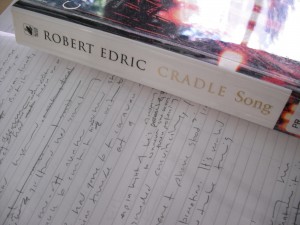
By Sarah Elsegood,
Arts and Humanities Faculty Librarian and Curator of Archives and Special Collections
The University of East Anglia has been gifted an important collection of literary manuscripts from prolific Yorkshire author Robert Edric (pseudonym for Gary Edric Armitage) who was born in Sheffield in 1956 and now lives in the East Riding of Yorkshire. The collection of 53 boxes contains early drafts of fragments and completed short stories, including proofs of five early unpublished novels. Edric writes initially in pencil and only transfers his work to computer at the final stage, so the evidence of his creative process is preserved in hard copy for future researchers. That the majority of the manuscripts are in pencil gives us additional conservation issues to consider. The archive covers the period from 1982-2005, and there is an agreement that the papers relating to later works will be passed to UEA at a future time.
A full listing of the archive, completed by Archives Assistant Bridget Gillies, can be found at www.uea.ac.uk/is/archives/edric
About Robert Edric
Edric’s first published novel A Winter Garden won the James Tait Black Award in 1985. His novels Peacetime and Gathering the Water were long listed for the Booker Prize in 2006 and 2008. A departure from literary fiction between 2003 and 2005 led to the publication of a trilogy of detective novels set in Hull, known as the ‘Song Trilogy’. In 2011 Edric was one of eight novelists selected for the Fiction Uncovered promotion for his 2011 novel The London Satyr, winning praise from UEA Creative Writing Professor Giles Foden, who was chair of the panel of judges.
Working on the Edric Archive…

The archive arrived already sorted into boxes arranged chronologically, together with an outline listing by the author. He notes how the various drafts of “pieces” and “finished and half-finished tales … blew around like leaves and seeds for a few years as other, more substantial stories and novels took shape.” Edric’s listing includes everything, whether “evaporated, destroyed and existing”.
With each new archive, my colleague and I together try to build up a picture of the writer. It is a gradual process of familiarization. On receipt we notice the chaotic or organized nature of the collection, and whether it brings with it any flora or fauna! Further clues are revealed through the appraisal, sorting and listing process, and from any correspondence. Parallel with this we gain an awareness from reading some of the published and unpublished work and reviews. Receiving the archive of a working author is even more interesting as the story of the life’s work isn’t yet over. I had some very entertaining conversations with the author by telephone and, in lieu of e-mail which he doesn’t use, Robert Edric sent us some delightful postcards, which are now in the archive.
We are very grateful and hope that further authors will come forward to augment our literary collections in this 40th anniversary year of the MA in Creative Writing at the School of Literature, Drama and Creative Writing.
Visits by appointment to archives@uea.ac.uk